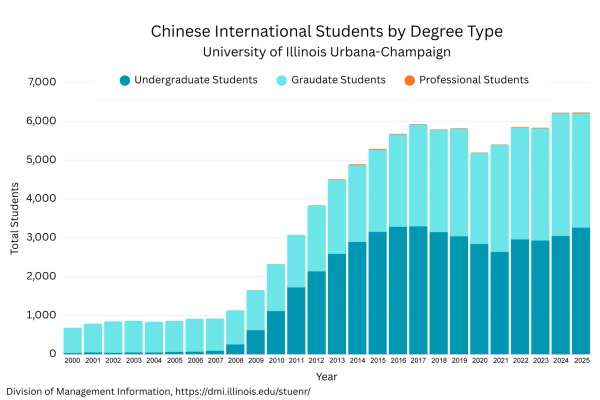Senate opposes DIA control of Hall
Oct 21, 2005
Last updated on May 11, 2016 at 10:59 p.m.
The Illinois Student Senate unanimously passed an executive order that “strongly opposes” a consideration by Chancellor Richard Herman to shift operational control of Assembly Hall from the Office of the Vice Chancellor for Student Affairs to the Division of Intercollegiate Athletics at their meeting Wednesday night.
The Illinois Student Senate’s executive order followed a unanimous vote by the Assembly Hall Advisory Committee Wednesday afternoon also opposed to the proposal.
This comes at a time when the University is looking at the possibility of renovating Assembly Hall.
“It is obviously something that’s important right now because the renovation of Assembly Hall is something everyone agrees needs to happen,” said Robin Kaler, spokeswoman for the University. “If we want this to happen, we need to move.”
Get The Daily Illini in your inbox!
The proposed renovation is estimated to cost between $65 and $70 million. Of that number, $14 million would go to install air conditioning, which would cost $500,000 a year to maintain.
“DIA has the capacity to make the project happen,” Kaler said.
Whatever decision is made, it is the chancellor’s intention to maintain the existing mix of programming at the hall, Kaler said.
Members of the Student Senate feel this change of authority involves several risks.
“We feel that Student Affairs is much more responsive to students than the DIA will ever be,” said Josh Rohrscheib, graduate student and co-president of the Illinois Student Senate. “I can’t see any way this is good for students, unless maybe DIA won’t renovate it unless they get control of it.”
If the DIA is not in control of the hall, then it should be Student Affairs’ responsibility to raise the funds necessary for the renovation, Kaler said. She added that the DIA needs to know if they will receive control so they can begin planning and budgeting the project.
One of the concerns for members of the senate is the risk to cultural programming at the hall. Illinois Student Senate members said they fear this will happen if the DIA assumes control.
Joseph Danavi, senior in LAS who is a student senator and a member of the Assembly Hall Advisory Committee, said the hall was established to be a venue for programming such as plays and concerts, as well as athletic events.
“If the DIA takes over Assembly Hall, it’s no longer going to be a multipurpose arena,” Danavi said. “It’ll become an athletic arena.”
He also is concerned that the DIA will not be as interested in bringing smaller acts such as Interpol, who played at the arena in September, because they do not generate as much money as bigger-name acts.
Another concern for the senate members is the $68.33 student fee that supports Assembly Hall. They fear the fee will remain, and the DIA will focus less on student interests.
“We’ll continue to pay the same fees, if not more so,” said Ryan Ruzic, junior in LAS and co-president of the Illinois Student Senate.
The proposed transfer of control arose from a report by the Assembly Hall Review Committee. Former chancellor Nancy Cantor commissioned the report in November 2003.
“Assembly Hall requires renovation, and the DIA is the only one of the Hall’s users that can muster enough funds from donations and corporate sponsorships to raise enough money to pay for it,” according to the Assembly Hall Review Committee’s report.
The report also acknowledges the importance of student interests in Assembly Hall because a large portion of the arena’s operating budget comes from student fees. It recommends that the arena’s budget remain independent of the donor-driven type of budget that is typical for the DIA.
“(Chancellor Herman) understands and is absolutely sensitive to the concerns of students,” Kaler said.
According to the executive order, the Illinois Student Senate is concerned with the trend toward moving programs out of the Office of the Vice Chancellor for Student Affairs. In recent years, the Office of Financial Aid and the Office of International Student Affairs moved out of the administrative authority of the vice chancellor’s office.
“We’re concerned that if that office diminishes, so will the student voice on campus,” Rohrscheib said.





